Performances
2015
14 Sep – 15 Sep
Director: Dimitris Karantzas
Grande Auditório
Read more
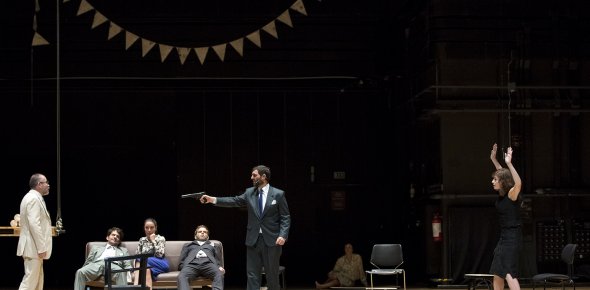
“Life is merciless. It’s much more vicious than we think”. So says Dimitris Dimitriadis, the internationally lauded author and thinker from Thessaloniki who wrote the landmark text Dying like a country. And it is the merciless quality of life, and the mercilessness of love, that occupies the playwright in this masterful work whose twists, reverses and repetitions are to play out on the stage. This erotic equation of passion and despair was staged by the talented young director, Dimitris Karantzas, and a select cast, in a production of the Onassis Cultural Centre – Athens, Greece. It was presented at the 68e Avignon Festival, with the support of the Onassis Cultural Centre – Athens. It is the first time that a Greek director is invited at the Avignon Festival. The innovative 26 year-old Dimitris Karantzas, treats the play as an eternal song of expectation and disappointment, maintaining the relationship between narrative, movement and sound. The Circle, which the playwright dedicates “to those that live”, is an erotic equation of passion and despair which presents eleven people of different genders, generations and sexual preferences but an irresistible shared need: to be loved. But as one of the characters, Mauve, says: “We always want something that doesn’t exist. We’re never satisfied with what does. That’s our mistake, but there’s no avoiding it. It’s in our nature. We’re throwing our lives away like this, but there’s no other way to make them ours”. Which is how Dimitriadis expresses the inevitability of our existence as he pushes his heroes to the very edge, having them set themselves ablaze and kill one another only to resurrect them a little later with a single, shared hope: that maybe this time they will find love.
10 Sep
Hang (hand pan) Concert by Kabeção Rodrigues
Archive-House (Gulbenkian Park)
Read more
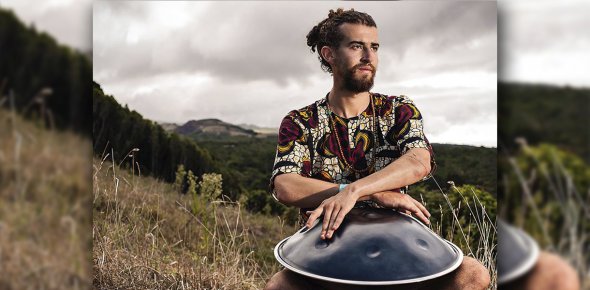
The hang is a handmade instrument in the idiophone class that was invented in Switzerland in 2000. It is composed of two half-shells of deep drawn, nitrided steel sheet, glued together at the rim, leaving the inside hollow and creating an "UFO" shape with two sides – the "Ding" and the "Gu". The top ("Ding") side has 8-9 membranes, each with a distinct tone, which form a musical scale. This scale can be major, minor, pentatonic, Arabic, or Celtic, among others. The "Ding" side is inspired by the Steel Pan or Steel Drum, a Caribbean instrument, and by the Gamelan from Indonesia. The "Gu" side has a bass port that is based on an Indian percussion instrument called "Gatam".
In collaboration with Programa Educativo dos Jardins Gulbenkian
9 Sep – 13 Sep
Compañía Silencio Blanco
Read more
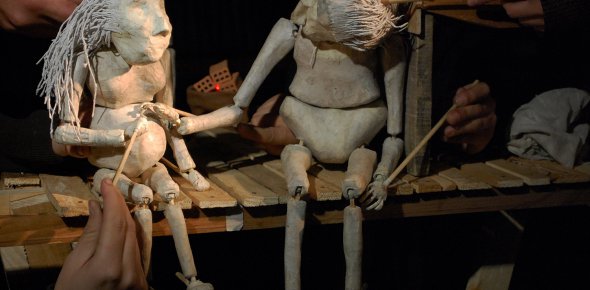
The mine collapses. A young miner is expelled from the coal mine in which he works. His only chance to keep working for the mining company is to head for the area of Chiflón del Diablo, known as one of the most dangerous places a miner can work. Daily situations allow us to know the intimacy and fragility of the characters, their daily heroism, and the unconditional waiting and uncertainty endured by their women, not knowing if their miner will come back again. It is a forgotten by history or perhaps buried deep in the coal mines, immersed in a true black silence. Silencio Blanco rereads the story of El Chiflón del Diablo by Baldomero Lillo, distinguished Chilean author, expressing the human side of the characters through white paper marionettes, which do no speak and narrate the story through their movement, gestures and a sonorous universe that lacks dialogue. The audience shall undergo this silence as well, giving a meaning to history through their experience.
Em colaboração com o Programa Gulbenkian Educação para a Cultura e a Ciência
6 Sep – 8 Sep
Director: Manuel Wiborg
Open Air Auditorium
Read more
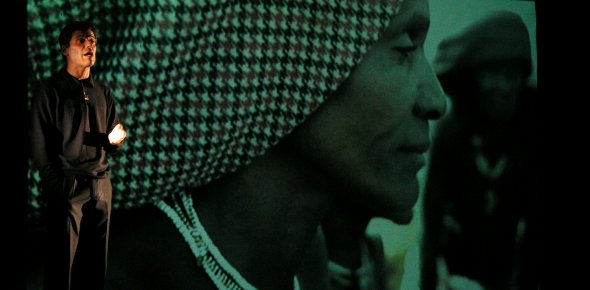
Vou lá visitar pastores (I'm going there to visit the sheperds) has been described as an epistolary exploration of an Angolan journey through Kuvale territory (1992-1997) by Angolan writer, anthropologist, poet and filmmaker Ruy Duarte de Carvalho. The book was published by Cotovia in May 1999 and is a massive work on the Kuvale, a pastoralist people from Southwest Angola. In April 2003, Culturgest invited the director and actor Manuel Wiborg to write a play based on the text, which José Eduardo Agualusa once said was impossible to represent before he eventually saw it on stage. Forty years after Angola's independence and 12 years after the play's world premiere, it is the perfect time to return to a text (and other texts by the same author) about a region and people from the deepest part of Angola and Africa. In the words of the author, "The aim of this text is to convey, through writings that preserve the characteristics of oral communication (cassettes), a knowledge based in part on oral information/tradition, but literarily complex and "ruminated" on in exhaustive bibliographies, making reference to the theoretical concerns of social sciences and underpinned by a detailed knowledge of lands and peoples." For the director and actor, it marks a return to a theatrical work in which text, speech and visual documents combine to form an incredibly beautiful spectacle. The images that were projected during the play, with the exception of maps and diagrams, were selected from a series of drawings, photographs and video recordings made by Ruy Duarte de Carvalho in Kuvale territory, which he generously made available.
The book I'm going there to visit the sheperds, an Angolan journey through Kuvale territory, published in 1999 by Cotovia, was adapted for the stage by Rui Guilherme Lopes and directed and acted by Manuel Wiborg. Having been performed in a co-production with Actores Produtores Associados and Culturgest, the play will be presented in three shows in the Open Air Auditorium of the Gulbenkian Foundation.
5 Sep – 7 Sep
Director: Nelson Valente
TEATRO ABERTO
Read more
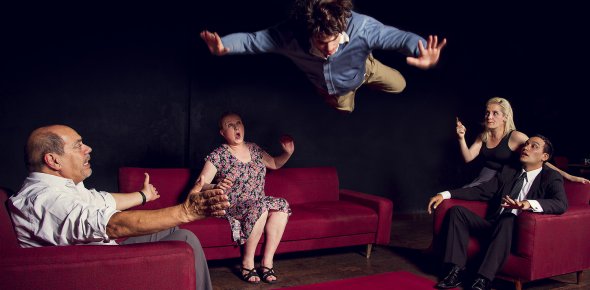
Combining an austere and refined naturalism with the construction of archetypal characters, the drama in this play addresses several intertwining themes: madness, family life, the revelation of truth and domestic violence. The staging places audiences within the space of representation to bring them closer to the actors and the action. "The Madman and the Shirt" has enjoyed an uninterrupted run of five seasons in Buenos Aires, as well as international tours and festival appearances, earning awards and rave reviews from the press. This play is now an indisputable landmark of independent theatre in Argentina. Director Nelson Valente: "A family hides its madman in every way possible. It hides him from the outside and from the inside. The ideal would be to suppress him. The madman grows, amorphous and monstrous, like a body inside a corset. His skill, and his downfall, is to say what he sees without filters.
4 Sep – 5 Sep
Orquestra de Câmara Portuguesa
Stage of the Grande Auditório
Read more
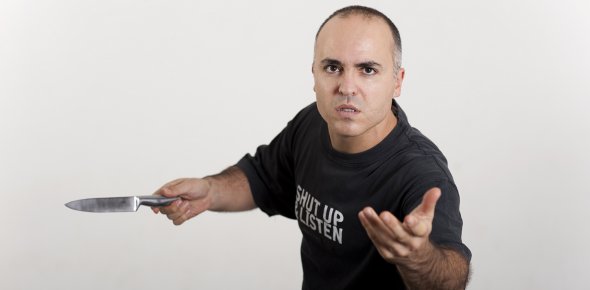
Okho, by Iannis Xenakis
Workers Union (symphonic movement for any loud sounding group of instruments), by Louis Andriessen
For me, music has been an extraordinary journey and an example of democracy and ethics: the moment it is performed, all of the musicians on the stage are equal. Each individual's worth is appreciated for their moral qualities: the commitment, preparation, presence of spirit, integrity, ethics and intelligence with which they express themselves. The open-minded artists that make up an orchestra come together in search of individual and collective perfection, enriching humanity in the process. This was one of the mottoes with which we created Orquestra de Câmara Portuguesa (OCP) in 2007. I've always liked artists who are subversive and provocative: for these special performances (will it be a "concert"...?), we will listen (closely, very closely) to works by Xenakis and Andriessen. Composed in France in 1989 by the Romania-born Greek immigrant, Okho was written for three djembes (large West African drums) and was commissioned by the government to mark the 200th anniversary of the French Revolution: perhaps a provocation against the French colonialist spirit? Workers Union was written in 1975. The work is a combination of individual freedom and harsh discipline; its rhythm is immensely detailed. Its notes, however, are only roughly indicated, resulting in a tenuous line, a carefully made choice by each member of the orchestra. Andriessen notes: "It's challenging to play as a group with these instructions: the same applies in a political organisation". In this way, the audience will also participate by reading selected texts by Amilcar Cabral and Frantz Fanon. (Pedro Carneiro)
21 Jun
Mito Algarvio Ensemble / Direction: João Frade
Open Air Auditorium
Read more
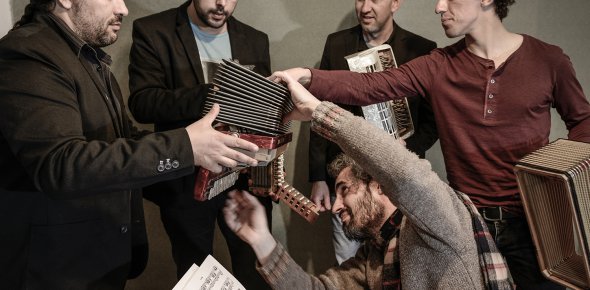
Cyneticum, a concert with acordeons
Situated between the Atlantic Ocean and the Mediterranean, Algarve is a region rich in accordion players, its traditional music deeply associated with the sound of this reed instrument. The programme for this concert at Next Future was created through a process of deconstructing, rebuilding, destroying and reconstructing various melodies, harmonies and rhythms to arrive at a perfect musical synthesis, the fruit of both a collective collaboration and individual contributions from the musical worlds of each player.
20 Jun
Soeur Marie Keyrouz and Ensemble de la Paix
Open Air Auditorium
Read more
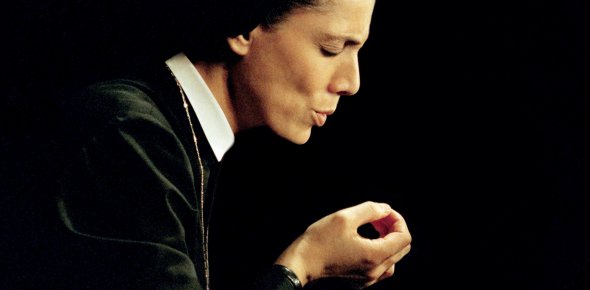
The more we learn how to affect the reality of our being by the beautiful and the sacred, the more we offer to human experience the privilege to live the infinite spirituality, which lives in our inner self and is the origin of everything. A prayer of Jesus Christ, one philosopher's reflection or mystic poetry – these meditations are chosen and sung to enlighten the candle that leads each human being’s way through their pilgrimage towards their inner selves. These meditations find their musical inspiration in the Aramaic, Byzantine, Syriac and Maronite traditional liturgies, as well as in the micro-intervals of classical oriental music and the colors used to support the sacred text. The Musicians, soloists, are active participants in these prayers, both when they accompany the song, and when they improvise, echoing the voice that gives itself humanly, spiritually and technically to the performance. May we, for the elegance of these meditations, provide the human being with an encounter with the divine and be allowed to melt into the mystery of the silence and the eternal peace of God?
19 Jun – 20 Jun
Gulbenkian Garage
Read more
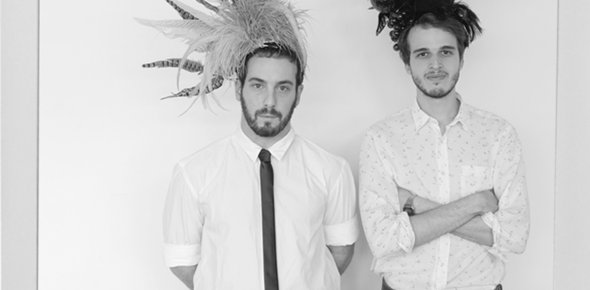
This year the Garage Ball is animated by the duo Selvagem, formed by the Brazilian DJs Millos Kaiser and Trepanado. Selvagem is also the name of the parties that they throw in Sao Paulo and Rio de Janeiro. They believe in associative free thinking regarding music, channeling it with an anarchic approach which blends disco, house, rock, techno, funk and soul, from all times and places.
2014
16 Sep – 17 Sep
Direction: Jaime Lorca, Teresita Iacobelli, Christian Ortega
Teatro Nacional D. Maria II
Read more
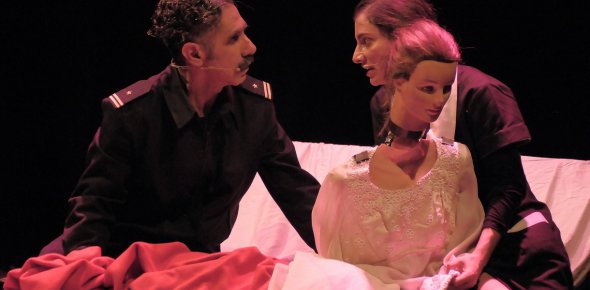
A version of Shakespeare’s great tragedy for actors and puppets.
13 Sep
Artistic Director: Paulo Aragão
Grande Auditório
Read more
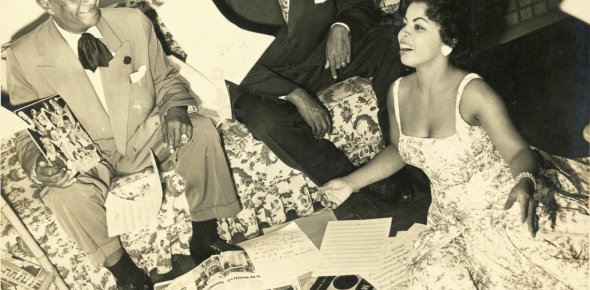
A band of 9 musicians strives to be as faithful as possible to the sonority of “Pessoal da Velha Guarda”, a radio program of much importance to the musical landscape in Brazil during the 40’s and the 50’s, nevertheless creating space for improvisation and to show the brilliance of its musicians united to celebrate the monumental ouevre of Alfredo da Rocha Vianna Filho, o “Pixinguinha”, born 117 years ago, on the 23rd of April 1897, date that has become the National Day of Choro.
13 Sep – 14 Sep
Theatre and dramaturgy: Trinidad González
Teatro do Bairro
Read more
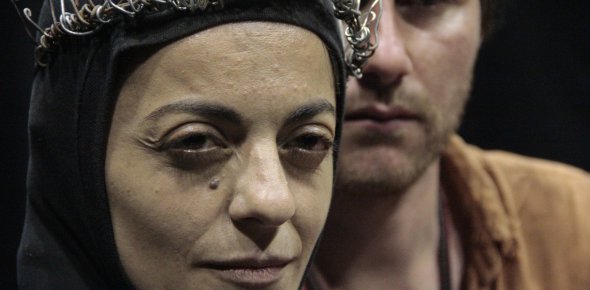
The Catholic Monarchs decreed the imprisonment of Christopher Columbus after ruling that he had engaged in abuses of power in the Indias. He, in response, requested an audience with Queen Isabella, the Catholic, to explain his acts and attempt to attain his acquittal.
9 Sep – 11 Sep
Direction: Miguel Seabra
Teatro Meridional
Read more
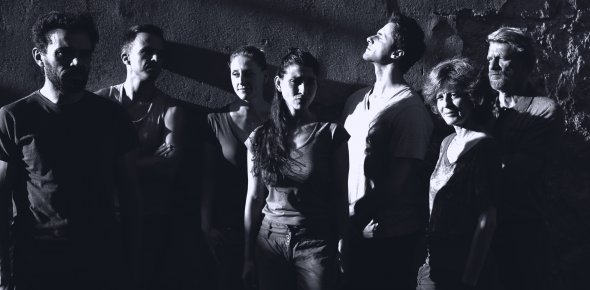
Juan Preciado, after his mother death goes to Comala in search of Pedro Páramo, his father. Along the way, when approaching the final destination, he meets several inhabitants who are in a way or another to Pedro Páramo.
6 Sep – 8 Sep
Direction: Guillermo Calderón
Teatro do Bairro
Read more
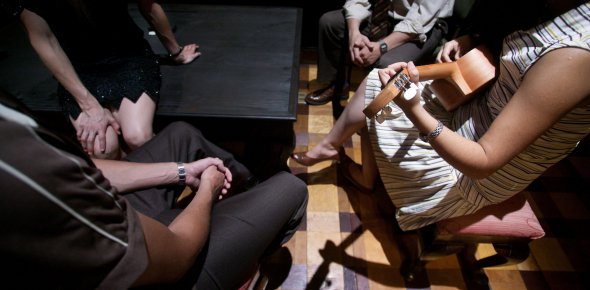
“Any act of resistance from the extremists obliges the armed forces to adopt drastic sanctions, not only against the aggressors, but also against all the detainees or to those under house arrest and constant surveillance. The armed forces ach Chilean Police will be ruthless in maintaining public order and constant vigilance. For each innocent life 10 elements of that undesirable group of Marxists shall be executed immediately, according to the legal provisions that the Military Code of Justice establishes in times of war.”
30st Division of the Intendancy from the Cautín Province, Temuco, Chile, 17 of September of 1973.
5 Sep – 6 Sep
Choreographer: Tamara Cubas
Grande Auditório
Read more
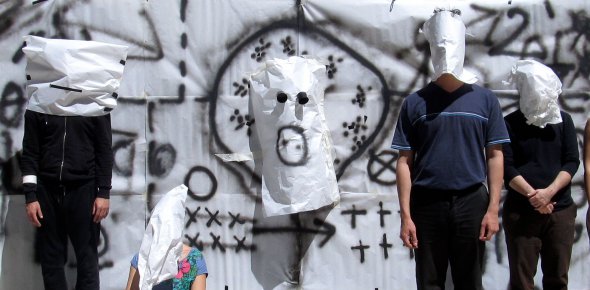
Through an imaginary collective, this piece questions the past and Uruguay’s colonial processes, in which the indigenous populations and their languages were extinct.
5 Sep – 6 Sep
Conception, direction and interpretation: Marcela Levi
Grande Auditório
Read more
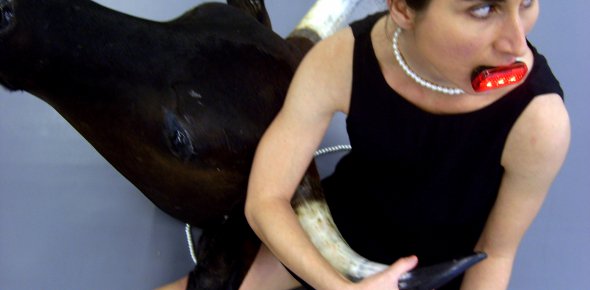
Marcela Levi has since 2002 been developing a language that creates tensions between the hierarchy body – object, focusing on several dichotomies (inside-outside, body-mind, active-passive, affirming-negating) that usually frame our perception.
2 Sep – 4 Sep
Direction: Rogério de Carvalho
Teatro do Bairro
Read more
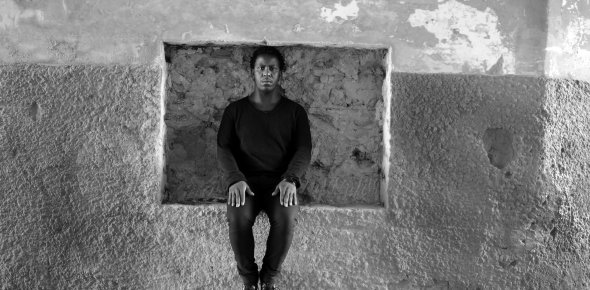
In the book ‘The True Confessions of an Albino Terrorist’ (As Confissões Verdadeiras de um Terrorista Albino), Breyten Breytenbach writes about his prison memories: an excruciating narrative of his journey through the infernal machine of South Africa’s prison system, in all its horror, unbelievable stories, human figures.
21 Jun
Anfiteatro ao Ar Livre
Read more
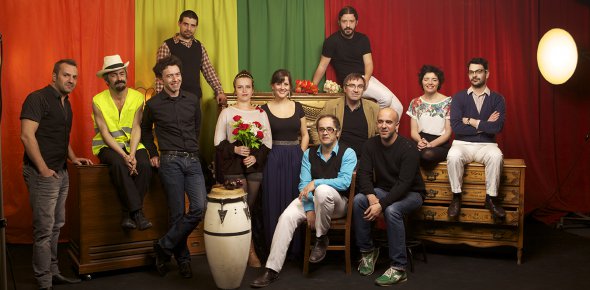
Who knows Carmen Miranda? Everybody. Even if only two or three out of the 300 songs recorded by the most international singer ever to be born in Portugal.
20 Jun
Foundation's Underground Parking
Read more
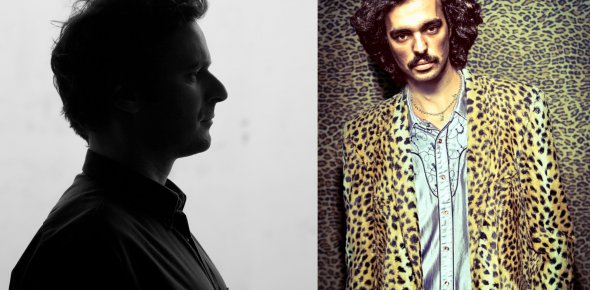
Lyndon Barry invites La Flama Blanca for a evening where South American sounds will continuously flourish.
2013
7 Jul
São Luiz Teatro Municipal (Sala Principal)
Read more
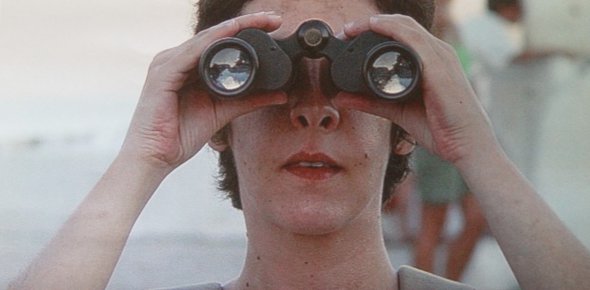
Director: João Samões (Portugal)
Africa is transformed into a place of imaginary representations, a huge territory in which all fantasies and ghosts can be idealised. In this play, realities and turbulences from the realm of the exotic and the erotic are created and manipulated; memories and reflections about colonialism and racism are mixed together. The name of the play turns our thoughts to the African diary of Michel Leiris, an exercise in the symbiotic writing of ethnography, psychoanalysis and surrealism. Time will reveal the marks and the unbreakable bonds between colonial expansion and the construction of modernity and the artistic vanguard in Europe. We can begin our journey with a famous painting by Picasso, from 1907, in which the painter projects the impact and the influence of the power of the African masks that he saw at the forgotten Musée du Trocadéro, in Paris, onto the bodies of the women at a brothel in Calle Avinyó, in Barcelona, breaking with the canons of academic realism and revolutionising the possibilities of the body’s representation in western art.
Support: Institut Français du Portugal, Dupla Cena, Teatro São Luiz
Co-production: Próximo Futuro / Fundação Calouste Gulbenkian
7 Jul
Anfiteatro ao Ar Livre
Read more
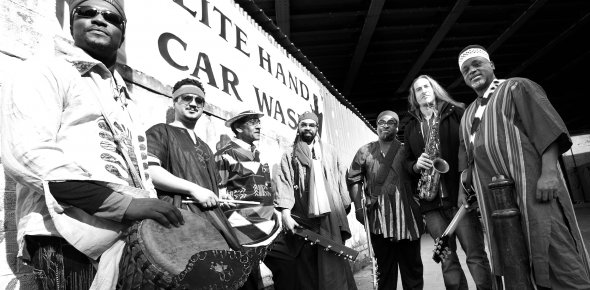
Rooted in 1970s Ghana, KonKoma adds a progressive edge to their rich blend of Afro-funk, jazz, soul and traditional African rhythms. Their debut album, released earlier this year through Soundway Records, won plaudits for its sophisticated mix of irresistible grooves and soulful melodies.
5 Jul
São Luiz Teatro Municipal (Jardim de Inverno)
Read more
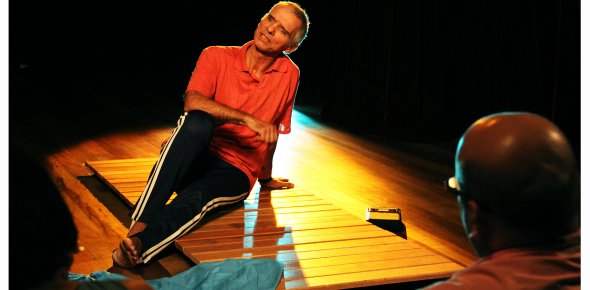
Author and performance: Ricardo Chacal (Brazil)
“A Marginal Story” is a theatrical monologue that follows the story of Chacal and offers us a tasty and intimate record of the cultural effervescence of the last 40 years in Rio de Janeiro. Using memory as its guiding thread, the performance develops into a scenic experience that flits between the personal and the collective, fiction and reality, theatre and documentary. His approach is neither formalistic nor academic: it is not the vision of a journalist, historian or essayist, but the vision of a poet. His originality lies in the fact that, for the protagonist, with his poetic words and irreverent presence, he chooses an artist who has always lived ‘in the eye of the hurricane’.
5 Jul – 6 Jul
Teatro do Bairro
Read more
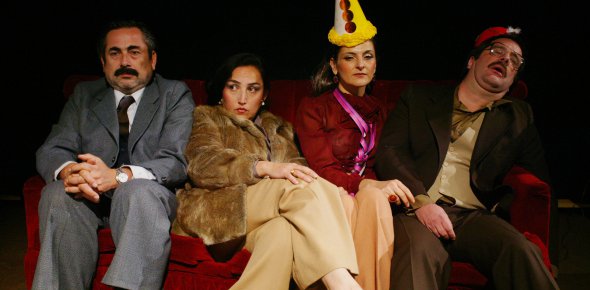
Director: Cristián Plana (Chile)
For those who know little about the history of Chile or for those who think that modern times should be as light as possible and lived to the full, as fast as the information that circulates among us, this work that analyses the narratives about the period of Pinochet’s dictatorship, made some years ago by many theatre companies, even appears to be a ’local‘ obsession, a problem of ‘theirs’, the ones who live on the other side of the mountains. And yet, these works help to promote some form of reconciliation. They are instruments used for analysing the historical past that so often prevented the cleansing of crimes and atrocious acts and they are also instruments that can be used for analysing the present. So that there can be some peace, this staging of the question of history is fundamental. “Chilean Wake”, based on a text by Sergio Vodanovic (1926–2001), and directed by Cristián Plana, is a play about a banal episode, a night spent among friends who are commemorating the Coup d’État led by Pinochet, on the night of 11 September 1973. Like this, we can see how the resentment motivated by the loss of one’s ‘class position’, by the fear of the other unknown neighbours, by marital frustration, by the attractions of power and authoritarianism, creates direct accomplices of that same authoritarianism. In this play, sexuality, or the frustration of not being able to express it, takes on a dimension that many historians, out of a sense of shame or through their own incapacity, have rarely associated with the manifestations of dictatorships of this type. And here it is, analysed and contextualised in a most lucid manner. Violence can have many different forms, and, in this field, it can also be fascist in nature. The actors are wonderful.
29 Jun
São Luiz Teatro Municipal (Jardim de Inverno)
Read more
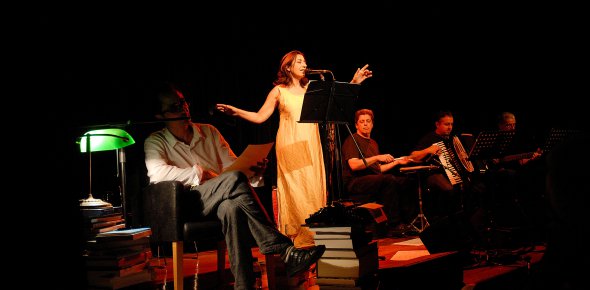
Direction: Eucanaã Ferraz
Narrator: João Miguel
Singer: Jussara Silveira
The show “Another Hour of the Star” adapts the book by Clarice Lispector to the stage, bringing together literature and song. The voice of the narrator – reading selected passages from the book – alternates with Brazilian songs that help to recount the story and create the ‘Claricean’ atmosphere in one of the author’s most compelling texts. “The Hour of the Star” (1977) is one of Clarice Lispector’s best-known books. It tells the story of Macabéa, a migrant from the north-east of Brazil who struggles for survival in the big city and, at the same time, the drama of its narrator – Clarice’s fictional mask – who struggles with writing to succeed in portraying a character that is far removed from her own socio-economic reality. Thus, like the book, “Another Hour of the Star” oscillates between pity for the fragile, gauche Macabéa, and the writer’s anguish in trying to overcome the inability to transpose into words the life of the poor and needy. But, while there is pain, there is also humour and sudden reversals of fortune, as in the relationship between Macabéa and her boyfriend, the Olympic worker, from the north-east like herself, rough and vain, who leaves her to stay with Glória, a sensual and confident girl from Rio de Janeiro.
Aknowledgments: Paulo Gurgel Valente, Editora Rocco
29 Jun – 30 Jun
São Luiz Teatro Municipal (Sala Principal)
Read more
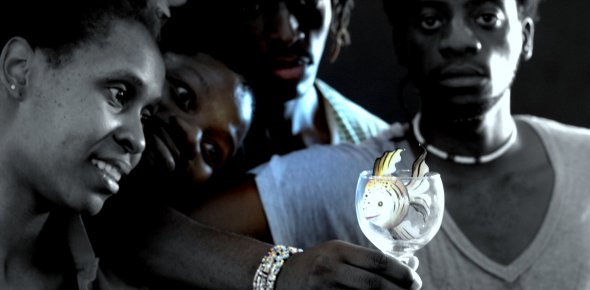
Idea and choreography: Horácio Macuácua (Mozambique)
Orobroy, Stop!
Orobroy means ‘thought’ in the language of the Gypsy nomads, the people in the south of Spain who created the origins of Flamenco. In this artistic expression, through the body, the voice, the percussion of the shoes and the guitar, the emotions of the depths of the human being are expressed. “Orobroy, Stop!” results from the recreation of Flamenco, the reconstruction of a previously unseen artistic horizon. The four dancers/creators, who come from different scenic backgrounds, from the traditional to the modern, from the batuque to the Spanish guitar, from the barefoot to those wearing shoes, from Europe to Africa, pass through timeless feelings of unease, generating a singular contemporary concept. The choreographer Horácio Macuácua, motivated by the encounter between two female dancers from different origins and disciplines, finds the inspiration to produce this work. After various attempts, the choreographer wished to explore the female universe from an intercultural viewpoint. Four female dancers characterised by two men, one woman and a structure made of iron and fabric express the evolutionary origin of human beings, their conflicts, doubts and fears, through movements filled with force and shouts denoting an animal instinct.
+
Smile, if you can!
In “Smile if you can!”, directed by Horácio Macuácua, two of the dancers Pedro Machava and Janeth Mulapha, who have been working with the Horácio Macuácua Company for some years now, continue on from the last creation, while the group is now joined by two new dancers, Osvaldo Passirivo and Pak Ndjamena, both of whom have been influenced by traditional dances. With the introduction of these two new dancers, the idea is to make room for a work with new languages and vocabularies so that they can inspire one another, and, at the same time, highlight certain contrasts through the history that each body brings and that each dancer carries with them. In this way, the Company is always seeking to renew itself, without being cramped by just one language or style, seeking out and paying attention to new challenges
Sponsor: Embaixada de Espanha em Moçambique
support: Centro Cultural Franco-Moçambicano e CNCD – Companhia Nacional de Canto e Dança
28 Jun
Anfiteatro ao Ar Livre
Read more
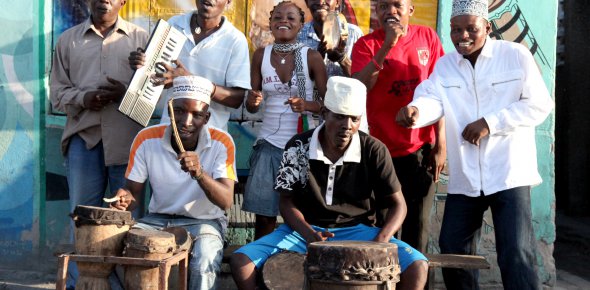
Jagwa Music are the leading exponent of the Mchiriku style, which originated twenty years ago in the poor suburbs of Dar es Salaam, when cheap Casio keyboards became available, and drew the attention of bands who were playing Chakacha dance music. What happened next is reminiscent of other, by now familiar stories (like that of Konono No.1): Jagwa Music & their peers were immediately attracted by the Casio's lo-fi sound, adopted it, hooked it to vintage amps and megaphones, and the resulting gritty, edgy, distortion-laden sound was rechristened Mchiriku. This new style has been thriving ever since in Tanzania, although it's been deliberately ignored by the media, as it is associated with uhuni (thuggery) and the city’s low life.
22 Jun – 23 Jun
São Luiz Teatro Municipal (Sala Principal)
Read more
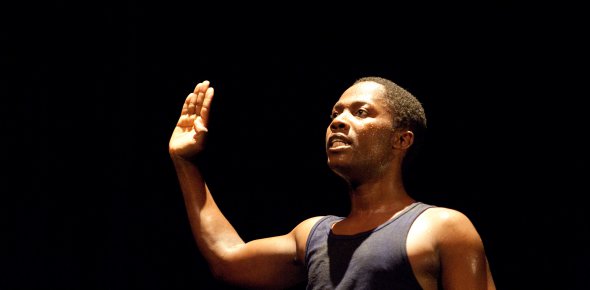
Choreography and dance: Panaíbra Gabriel Canda (Mozambique)
“Time and Space: The Marrabenta Solos” explores a crisis of identity, deconstructs cultural representations of a “pure” African body, particularly the Mozambican body. Since snatching independence from Portugal in 1975, Mozambique has been a land of social and political rifts, which have seen an inflexible communist model gradually make way for a fragile democracy. The performance explores the idea of today’s African body: a post-colonial, plural body that has absorbed the ideals of nationalism, modernity, socialism and freedom of expression, my own body. The performance is accompanied by a guitarist, who explores the Marrabenta music, a musical form born in the 1950s from a mixture of local and European influences, in particular a Portuguese guitar
co-production: Sylt Quelle Cultural awards 2009 – Goethe Institut Joanesburgo
with the support of: Kunstenfestivaldesarts, Bates Festival, Festival Panorama, VSArtsNM
21 Jun – 22 Jun
Calouste Gulbenkian Foundation Garage
Read more
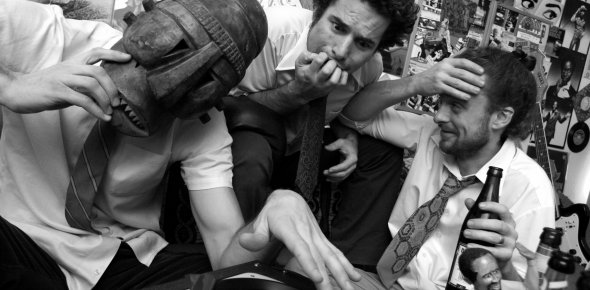
Right after the opening of both "Present Tense" and "9th Edition of the amako Photography Encounters" exhibitions there will be a Ball at Calouste Gulbenkian Foundation Garage, with DJ Rui Miguel Abreu warm up, followed by the Analog Africa Soundsystem (with Samy Ben Redjeb and Pedo Knopp).
2012
8 Jul
Kimi Djabaté
Anfiteatro ao Ar Livre
Read more
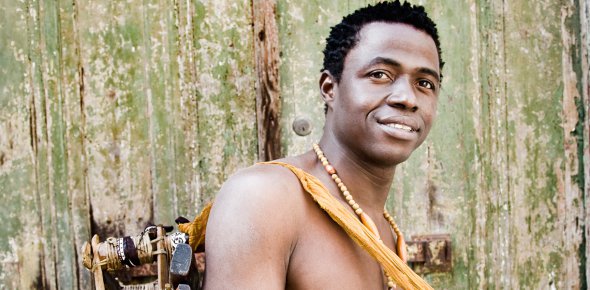
This Guinean griot musician proposes a concert that is representative of the continuation of mandinga traditional music of Guinea-Bissau with contemporary music.
7 Jul – 8 Jul
Lola Arias
Grande Auditório
Read more
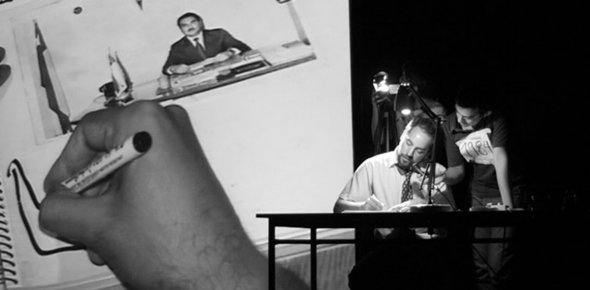
“El año en que nací” surges from the same concept of the work “Mi vida después”. Young people born during the dictatorship's reconstruct the youth of their parents, from photos, letters, records, clothes, stories and memories erased.
7 Jul
Med Fusion
Anfiteatro ao Ar Livre
Read more
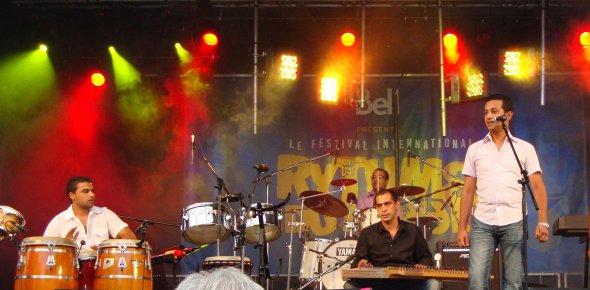
Med Fusion is a musical band strongly marked by the Tunisian revolution, the so called Jasmine revolution, which began in February 2011.
4 Jul – 6 Jul
Cia. dos Atores
Teatro do Bairro
Read more
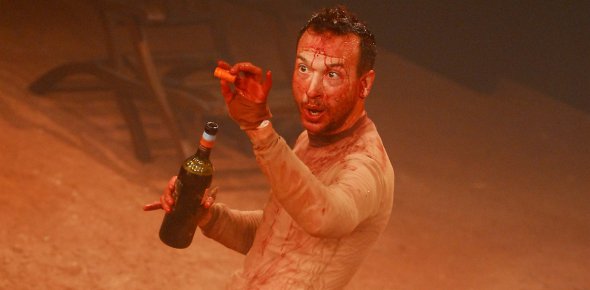
After being tortured in an arid and inhospitable environment, Bait Man (Marcelo Olinto) begins a narrative and thus gives shape to his thoughts.
1 Jul
Coletivo Pedro Carneiro
Gulbenkian Gardens
Read more

The music of John Luther Adams is inspired by the earth. Resident in Alaska, the composer has created a major art book, which has been interpreted in unusual places: in the vast desert of Anza-Borrego, in the forests of New England or on the tundra of the Alaska Range.
30 Jun – 1 Jul
Elisa Zulueta
Outdoor Auditorium
Read more
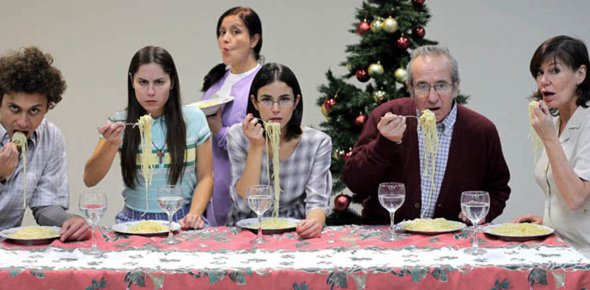
Gladys is the second play performed by the Chilean actress, playwright and director Elisa Zulueta and was premiered in July 2011, at the Teatro del Puente, Santiago, Chile.
29 Jun
Chelpa Ferro + Pedro Tudela
Teatro do Bairro
Read more

In 2010, the Calouste Gulbenkian Foundation presented the experimental exhibition of ceramic art from Barrão. This time, Barrão comes with his musical project Chelpa Ferro.
29 Jun – 8 Jul
Theatre Prague
Tenda
Read more
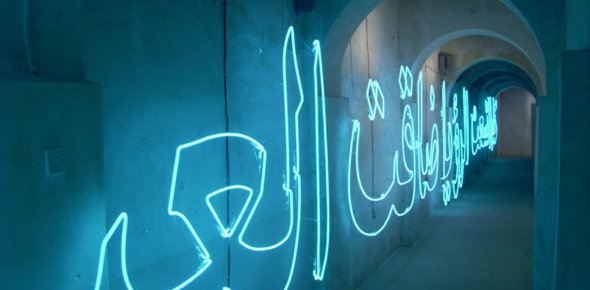
In this proposal of the Teatro Praga, the Arabian “OneThousand and One Nights” are Tales of Kings which are worth gold but are exchanged ‘for nickels’.
22 Jun
Anfiteatro ao Ar Livre
Read more

This album tells the story of my Tunisia, the story of the dark years as seen through my eyes: through my experience as a student, a young rebel and dissenter, through my years of artistic and ideological struggle, and through my immigrant tears, my suffering and my love of freedom. I dedicate this album to all those who gave their lives so that one day Tunisia might be free. The road is long but every day...a new sun rises and new hopes emerge...and we are these hopes.
22 Jun – 1 Jul
Daniela Thomas
Grande Auditório
Read more
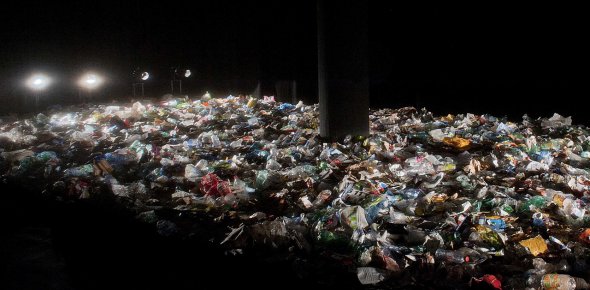
"Breath" is a play by the Irish author Samuel Beckett. It is probably the shortest play ever written.
2011
3 Jul
Shangaan Electro
Open-Air Amphitheatre
Read more
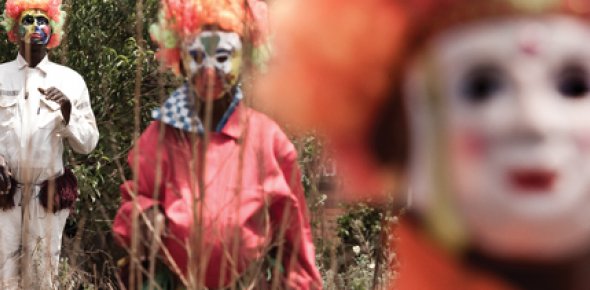
Shangaan Electro: New Wave Dance Music from South Africa (Honest Jon's) was one of the most important records of 2010, amounting to a compilation of some of greatest hits from the world of Shangaan music. Shangaan music comes from the city of Malamulele, in the province of Limpopo (the northernmost region of South Africa, which forms a border with Botswana, Zimbabwe and Mozambique).
1 Jul – 3 Jul
Villa + Discurso
Sala Polivalente of the Modern Art Centre
Read more
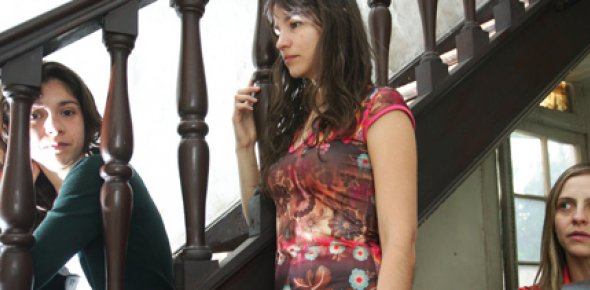
Yes, we really do like these two new plays by Guillermo Calderón. We like them so much that, after presenting Neva last year, we have decided to re-present the last two plays written by this extraordinary Chilean stage director and playwright, and performed by some equally extraordinary actresses. The two plays take place at the Villa Grimaldi, known under the Dictatorship as Londres 38, a house that has sad and gloomy associations with Pinochet’s regime.
26 Jun
Baloji
Open-Air Amphitheatre
Read more
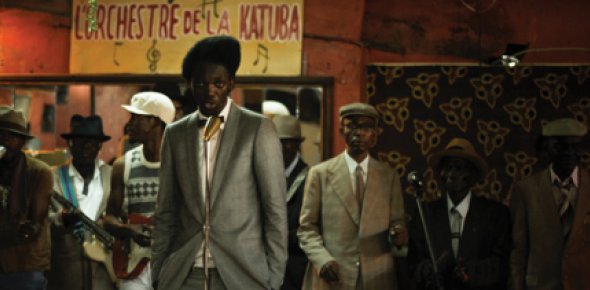
Europe and Africa are both important parts of the personality of Baloji, a Congolese musician living in Brussels. This geographical bipolarity can be clearly seen in his artistic project, which combines the fluidity of hip-hop with highly passionate soul or highlife music, always played by the omnipresent sub-Saharan voodoo.
22 Jun – 23 Jun
Grupo Lakka
Read more
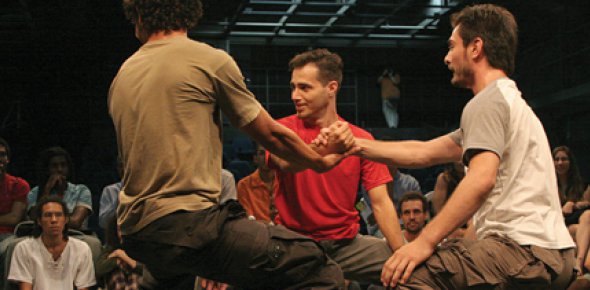
This Brazilian choreographer and performer, who forms part of the contemporary dance movement that is taking place in Brazil and has participated in the renewal of South American dance, was trained in classical dance, jazz dance and street dances.
19 Jun
Victor Gama and Pedro Carneiro
Gulbenkian Garden
Read more
Victor Gama has constructed his work around the various rituals existing between technology and Nature. One doesn’t need to know his biography in any great depth to realise that his roots are in the Black Continent. Victor Gama uses his music and his magnificent instruments – created by himself and gloriously surviving as unique works of art – as creative vehicles for conveying that world, giving rise to a form of music that, although quite singular in nature, is nonetheless also universal.
18 Jun
Orquestra Gulbenkian and Drumming - Grupo de Percussão
Open-Air Amphitheatre
Read more
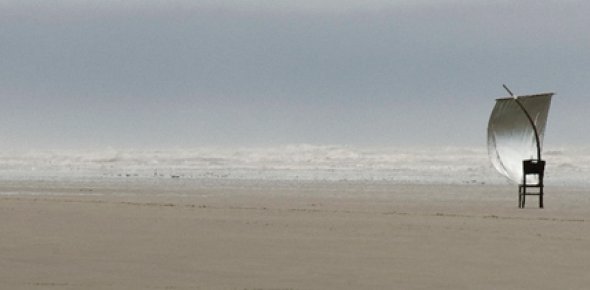
Classical music is the property of the western upper classes and represents the highest expression of all musical traditions created by man. Is this true? Not really. In music, as in life, everything is interconnected. To consider our own culture, more precisely a small part of it, as the icing on the cake is not only ignorant, but absurd. The roots and tentacles of classical music spread far and wide.
16 Jun – 18 Jun
Handspring Puppet Company
Read more
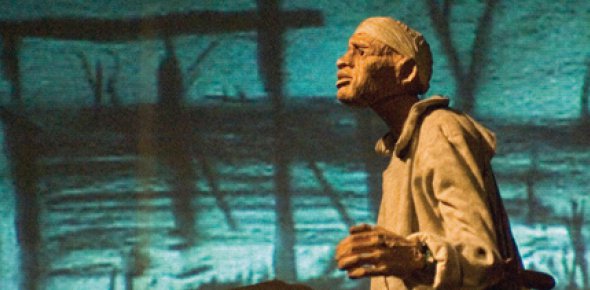
Many spectators in Lisbon will remember the previous visit paid to the capital by this South African theatre company, one of the mainstays of modern-day theatre, with performances such as Faustus in Africa or Il Ritorno d’Ulisse.
2010
4 Jul
Lucas Santtana
Open-Air Amphitheatre
Read more
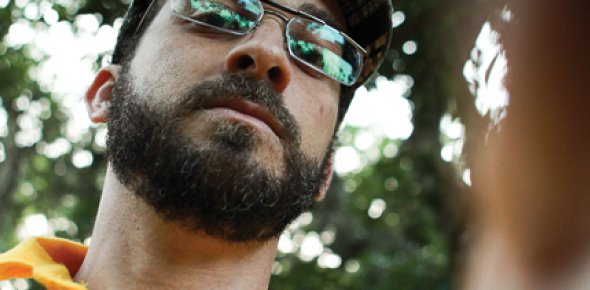
Born in Baía, just like Tom Zé, but now living in Rio de Janeiro, Lucas Santtana produces music that is a mixture of tradition and experimentalism, a way of doing things that has always been particularly noticeable in the Rio artistic and musical scene.
3 Jul
Cribles
Grande Auditório
Read more
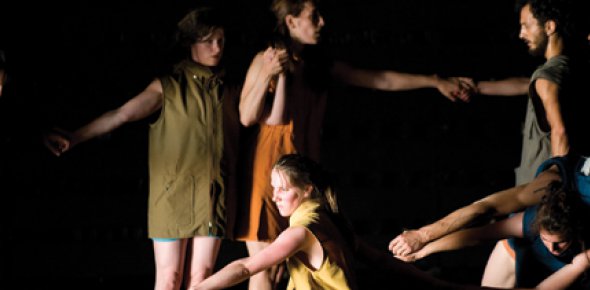
The choreographer says that this dance was designed as a simple way of showing people festivities, consecrations, wedding dances, war dances, processions, movements taking place both in unison and in disharmony, even the movements of legs that evoke musical comedy.
3 Jul
Soundway Records
Terrace of the Modern Art Centre
Read more
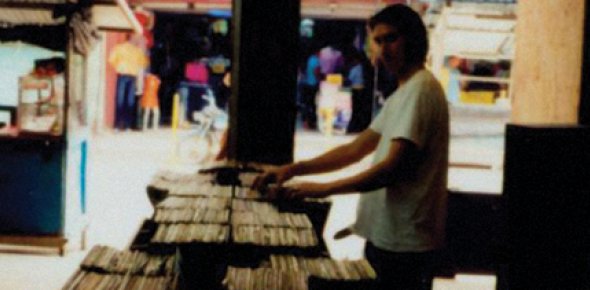
Soundway Records is one of the leading examples in a group of record companies dedicating themselves to the musicological archaeology of the inexhaustible heritage that has been demonstrated by the musical production of Latin America and the Caribbean, Africa, and both the Middle and Far East, over the last few decades.
2 Jul
Lula Pena
Open Air Amphitheatre
Read more
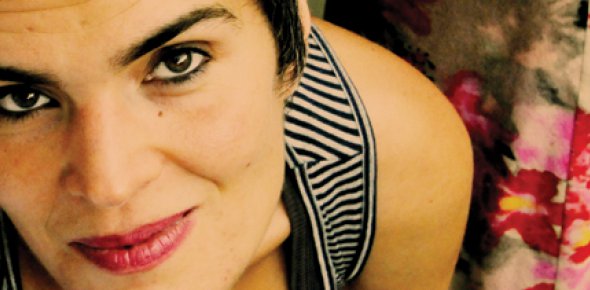
First it was “Phados” (1998), that unexpected and sweetly disturbing album; next there was that long, never-ending twelve year wait, which has finally come to an end now with the “Troubadour” work. Through all the cartography of travels, drawn to the sound of a gentle breeze, through days and nights, we were able to witness rare live acts.
27 Jun
Open Air Amphitheatre
Read more
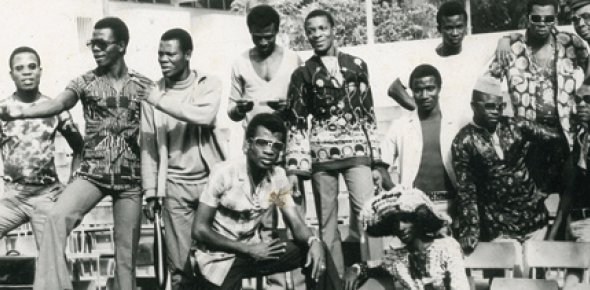
This legendary and almost forgotten orchestra from Benin, which first achieved fame in the 1960s and 1970s, now returns to concerts after its back catalogue was recently rediscovered by record companies such as Analog Africa and Soundway Records.
25 Jun – 26 Jun
Companhia Teatro de La Memória
Grande Auditório
Read more
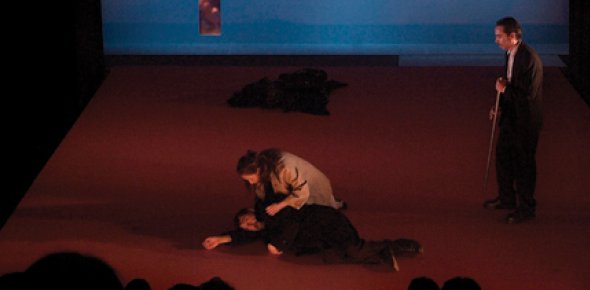
Let us attempt the following exercise in speculation: if Beckett were Chilean, how would he have written? How would he have staged his plays? This is, of course, a merely hypothetical exercise that does not demand an answer of any particular scientific merit. And yet, when we watch Hechos Consumados and see its set design and the way in which it is staged, it is mainly Beckett that we are reminded of.
19 Jun – 20 Jun
Companhia Teatro en el Blanco
Grande Auditório
Read more
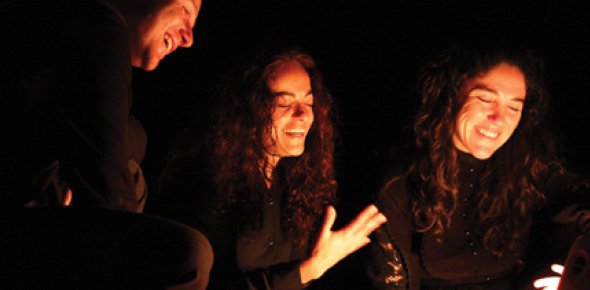
Chilean theatre is, together with Argentinean theatre, one of the most creative forces on the Latin American scene, having also created a vocal technique that is peculiar to it alone. It is mainly a theatre of words and text, being largely based on the work of the actor, with little attention being paid to scenographic mannerisms, and still living very much from its constant revisiting of Chile’s recent political history.
18 Jun
Fritz Lang / Martin Matalon
Open-Air Amphitheatre
Read more

It is a rare privilege to have the chance to either see or re-see the film Metropolis, by Fritz Lang, produced in 1927 and a universal reference not only in German cinema, but also worldwide. This is a film in which both the costs and the complexity of its production have become legendary, a work of reference for all essays on utopias, a work about the industrial Megalopolis, housing in its underground world thousands of workers, whose identification was a number, a work about what at that time were considered to be the evils of technical progress, in short a film about the perversions of totalitarianism.




















































